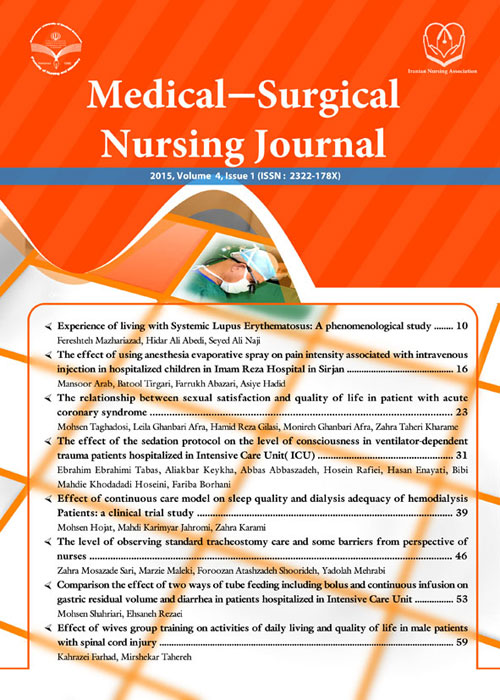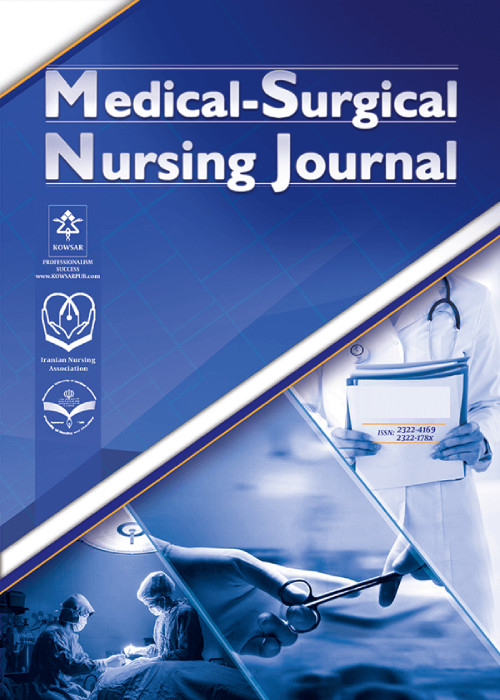فهرست مطالب

Iranian Journal Of Medical - Surgical Nursing
Volume:6 Issue: 1, May 2017
- تاریخ انتشار: 1396/04/30
- تعداد عناوین: 8
-
-
Pages 1-7BackgroundMultiple sclerosis (MS) is one of the chronic diseases of the central nervous system, management and treatment of which are hinged upon proper treatment adherence. In this study, we sought to determine the effect of self-management program on treatment adherence in patients with MS.MethodsThis semi-experimental study was conducted on 78 patients with MS referred to MS Association of Zahedan, Iran, in 2016. The participants were selected through convenience sampling and randomly divided into two groups of intervention and control. The educational program was implemented for the intervention group in the form of five 90-minute in-person sessions based on problem solving. Treatment adherence of patients was measured before and two months after the last educational session using Multiple Sclerosis Treatment Adherence Questionnaire (MS-TAQ). Data analysis was performed in SPSS, version 16, using Chi-square test, as well as paired and independent t-tests.ResultsAfter the intervention, mean score of treatment adherence deteriorated in dimensions of barriers to treatment adherence (P=0.004) and disease side effects (PConclusionSelf-management program reduced side effects and barriers to treatment adherence, while enhancing Coping and treatment adherence in patients with MS. Therefore, applying this method as a nursing intervention is recommended to promote patient health.Keywords: Treatment adherence, Self-management, Multiple sclerosis
-
Pages 8-13BackgroundPruritus is one of the most common complications in the hemodialysis patients affecting their quality of life. This study aimed to determine the effect of baby oil on reducing pruritus severity in these patients.MethodsThis clinical trial was conducted on the patients referred to one of the dialysis centers of Kerman, Iran, 2016. A total of 80 patients were selected through convenience sampling method and randomly assigned into two groups of intervention and control. In the intervention group, for four weeks (12 sessions), the researcher applied 3-5 ml of baby oil on the itchy skin for 15 min at the selected center. Data collection was carried out using visual analogue scale (VAS) to measure the pre- and post-intervention pruritus severity. Data analysis was performed in SPSS, version 18, using descriptive statistics, Chi-squared test, as well as independent and paired t-tests.ResultsIn the pre-intervention stage, the mean pruritus severity score of the intervention and control groups were 5.87±2.43 and 6.21±2.29, respectively, which altered to 3.37±2.11 and 6.28±1.96 after the intervention, respectively (PConclusionRegarding the results of the present study, administration of baby oil decreased pruritus severity in the hemodialysis patients. This cost-effective agent is not associated with major adverse effects; therefore, its administration is recommended.Keywords: Baby oil, Hemodialysis, Pruritus, Xeroderma
-
Pages 14-20BackgroundGlobally, multiple sclerosis (MS) is one of the leading causes of disability and is associated with a wide range of complications. Therefore, identifying patient needs and providing education based on an appropriate nursing model seems crucial. In this study, we aimed to evaluate the effect of Orem-based self-care education program on MS complications.MethodsThis clinical trial was conducted on 88 MS patients, who were members of MS Association of Zahedan, Iran, during 2014-15. The subjects were randomly selected through convenience sampling method and divided into intervention and control groups (n=44). In total, nine 45-minute group training sessions were held for the intervention group based on the patient needs and Orem model. Before and three months after the intervention, the form of assessment of disease complications was completed by both groups. Data analysis was performed in SPSS, version 16, using Chi-squared test, as well as paired and independent t-tests.ResultsAfter the intervention, all the reported complications, including balance disorder, muscle cramp, fatigue, urinary incontinence, constipation, fecal incontinence, myasthenia, reduced memory, and double vision, significantly improved (PConclusionImplementing self-care programs based on Orems model ameliorated disease complications in MS patients. Thus, we recommend healthcare organizations use this self-care program as an easy and beneficial intervention.Keywords: Orem's self-care model, Multiple sclerosis, Self-care
-
Pages 21-26BackgroundOne of the important hypertonic solutions is 50% dextrose. Phlebitis is the most common complication of this solution, the management of which is quite necessary. Regarding this, the present study aimed to compare the effect of warm moist compress and Calendula ointment on the severity of phlebitis caused by 50% dextrose infusion.MethodsThis clinical trial was conducted on 96 patients admitted to five surgery units of a teaching hospital in Tehran, Iran, who received 50% dextrose through intravenous catheter in 2016-2017. The study population was selected through convenience sampling technique, and then randomly assigned into three groups of Calendula, compress, and control. The site of intravenous catheters was constantly evaluated from the beginning of dextrose infusion to the emergence of phlebitis. After the onset of phlebitis, the affected locations were managed with the application of warm moist compress (for 20 min) and Calendula ointment (2.5 g) in the compress and Calendula groups, respectively. The interventions were performed every 8 h for three days, and the severity of phlebitis was assessed before and three days after the interventions using Visual Infusion Phlebitis score. Data analysis was performed in SPSS version 22 using Chi-square test, one-way ANOVA, and repeated measures ANOVA.ResultsAccording to the results, the severity of phlebitis had a more significant reduction in the Calendula group (P=0.002), compared to that in the compress group (P=0.006) after the intervention. This difference between the groups was significant only on the second (P=0.003) and third (PConclusionAs the findings of the present study indicated, the application of Calendula ointment decreased the severity of phlebitis in a shorter duration, compared to the use of warm moist compress. Therefore, this ointment is recommended to be used for the reduction of phlebitis severity.Keywords: Phlebitis, Catheterization, Dextrose, Calendula
-
Pages 27-33BackgroundRestless legs syndrome (RLS) is one of the most common problems of hemodialysis patients affecting their sleep quality. Therefore, it is important for these patients to develop several coping strategies. Given the fact that herbal medicine has been used from ancient times due to their effectiveness and low adverse effects, this study aimed to determine the effect of Hypiran herbal medicine on the sleep quality of hemodialysis patients with RLS.MethodsThis quasi-experimental study was conducted on the hemodialysis patients with RLS referred to three selected hospitals of Tehran, Iran, in 2016. A total of 180 patients were selected through convenience sampling method and randomly assigned into two groups of control and intervention. The subjects in the intervention group were treated by drop of Hypiran three times a day (30 drops each time) for four months. On the other hand, the patients in the control group received placebo. Data was collected using demographic data form, RLS assessment questionnaire, and Pittsburgh Sleep Quality Index. Data analysis was performed by applying descriptive statistics, as well as Chi-squared and independent and paired t-tests in SPSS software, version 18.ResultsAt the post-intervention phase, the mean score of the sleep quality of the subjects in the intervention group changed from 17.51±0.21 to 10.55±0.59 (PConclusionGiven the results, the sleep quality of the hemodialysis patients with RLS improved by using Hypiran oral drops. Therefore, it is recommended to use this herbal medicine to improve sleep quality in these patients.Keywords: Sleep, Hypericum perforatum, Hemodialysis, Restless legs syndrome
-
Pages 34-40BackgroundMost patients experience decreased physical, psychosocial, and spiritual comfort while receiving mechanical ventilation. Regarding the Muslim patients, diminished comfort might be associated with alterations in performing daily rituals, such as saying prayers (salat) and reciting the Holy Quran. This pilot study aimed to determine the effects of comfort care integrated with the Holy Quran recitation on comfort in Muslim patients being mechanically ventilated.MethodsThis quasi-experimental study was performed on a group of participants using pretest-posttest design. The samples consisted of ten Muslim patients under mechanical ventilation who met the inclusion criteria. Each participant was provided with the comfort care integrated with the Holy Quran recitation for three days. A modified version of Shortened General Comfort Questionnaire was utilized to evaluate comfort of the participants. The data were analyzed by SPSS using paired t-test.ResultsMean score of total comfort increased significantly after receiving the comfort care integrated with recitation of the Holy Quran (t=11.42, p=0). In addition, mean score of each context of comfort (i.e. physical, psychospiritual, environmental, and sociocultural comforts) also augmented significantly post-intervention.ConclusionThis pilot study showed that the comfort care integrated with the Holy Quran recitation can be an effective way of enhancing comfort of Muslim patients under mechanical ventilation.Keywords: Artificial, Islam, Patient comfort, Respiration
-
Pages 41-50BackgroundAnxiety is one of the main problems in patients waiting for diagnostic procedures for digestive disorders, which unfavourably affects their recovery process. Therefore, it is essential to modify or eliminate it by approved methods that are not associated with major adverse effects. This study aimed to determine the effect of peppermint aromatherapy on the level of anxiety in patients undergoing colonoscopy.MethodsThis clinical trial was conducted on 50 patients undergoing colonoscopy referred to one of the training Quaem Hospital affiliated to Mashhad University of Medical Sciences, Mashhad, Iran, in 2015. The samples were selected through convenience sampling method, and they were randomly assigned into two groups of intervention and control. The subjects in the intervention group inhaled three drops of pure peppermint essential oil and 5 cc distilled water with a nebulizer mask for 10 min, half an hour prior to the colonoscopy. However, the patients in the control group inhaled distilled water. The level of anxiety was estimated in the pre- and post-intervention phases using Spielberger State-Trait Anxiety Inventory. Data analysis was performed in SPSS software, version 19 using Fishers exact and Chi-squared tests, as well as paired and independent samples t-tests.ResultsAccording to the results of this study, the mean scores of anxiety were changed from 52.1±6.9 and 52.4±7.2 at the pre-intervention phase to 45.5±4.0 and 50.1±5.9 at the post-intervention stage, respectively (PConclusionRegarding the results, peppermint aromatherapy can decrease the level of anxiety before undergoing a colonoscopy. Therefore, it is recommended to employ this non-pharmacological, low-risk, and pleasant method for patients before invasive procedures such as colonoscopy.Keywords: Anxiety, Colonoscopy, Aromatherapy, Mentha piperita
-
Pages 51-60BackgroundOne of the most important symptoms and complications of breast cancer is pain with an extensive impact on life dimensions, management of which requires comprehensive nursing care and interventions. Given that spiritual care is an essential and unique part of care and spirituality is an indispensable part of man's life, we aimed to determine the effect of spiritual care in breast cancer patients from a multidimensional viewpointMethodsThis clinical trial was conducted on breast cancer patients who presented to two medical centers at Isfahan, Iran, during 2014. Fifty patients were randomly selected and assigned to intervention and control groups. For the intervention group, the spiritual care program was implemented in groups of five in ten 60-minute long sessions. Both groups completed the Multidimensional Pain Inventory (MPI), which is a self-report questionnaire, immediately before and six weeks after the intervention. To analyze the data, descriptive statistics, analysis of covariance, and Chi-squared test were performed in SPSS, version 18.ResultsAfter administering the spiritual care program in the intervention group, the mean scores of pain severity dimensions (P=0.004), disrupted daily activity (PConclusionSpiritual care is effective on the reduction of pain severity and its adverse effects on the lives of breast cancer patients. Therefore, it is suggested to be used as a non-pharmaceutical complementary treatment for pain relief.Keywords: Spiritual therapies, Breast neoplasms, Iran, Pain


